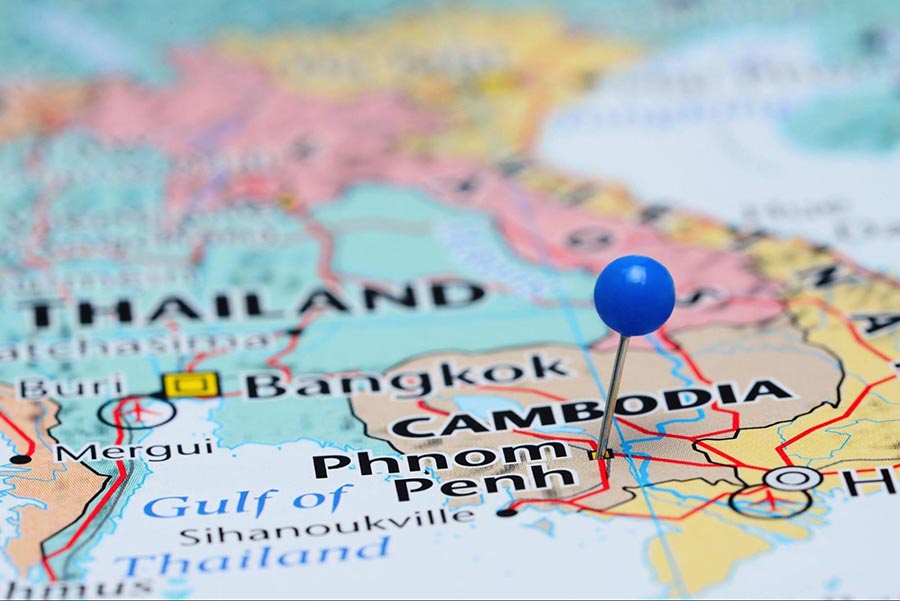What is a Digital Nomad and How to Become One: A Concise Guide

In today's fast-paced, interconnected world, the concept of a digital nomad has become increasingly popular. A digital nomad is an individual who leverages technology to work remotely while leading a nomadic lifestyle, traveling across the globe. As the traditional boundaries of offices dissolve and the internet permeates every aspect of daily life, more and more people are attracted to the opportunities and adventures of being a digital nomad.
Becoming a digital nomad can be a transformative experience, offering unparalleled freedom and the chance to explore new cultures and locations. However, it is crucial to possess the right skills and to find a supportive community to make the transition to this lifestyle as seamless as possible. With careful planning, realistic goals, and a solid foundation, aspiring digital nomads can embark on their journey to a fulfilling and exciting new way of working and living.
- Understanding the Digital Nomad Lifestyle
- Getting Started as a Digital Nomad
- Planning Your Digital Nomad Journey
- Maintaining the Digital Nomad Lifestyle
- Overcoming Challenges of the Digital Nomad Life
- Maximizing Digital Nomad Opportunities
Understanding the Digital Nomad Lifestyle

What is a Digital Nomad?
A digital nomad is someone who works for a company part-time, full-time, or as a contractor but does not report to one specific location. These individuals are entirely remote workers, often leveraging technology to perform their job duties from a distance. This unique approach to work allows for greater flexibility and freedom, enabling digital nomads to travel and explore the world while still earning a living.
Some common industries for digital nomads:
- Content creation and writing
- Graphic design and web development
- Freelance consulting or coaching
- Digital marketing and social media management
Some common industries for digital nomads include:
How Remote Work Fuels the Lifestyle
The rise of remote work has undoubtedly contributed to the popularity of the digital nomad lifestyle. With many companies embracing telecommuting options, employees are no longer bound to a physical office space. Furthermore, advancements in technology, such as high-speed internet, video conferencing, and collaboration tools, have made it easier than ever for remote workers to stay connected and productive.
Some benefits of remote work for digital nomads include:
- Flexibility: Working remotely offers the advantage of flexibility, allowing digital nomads to set their own schedules and decide when (and where) to work. This freedom enables them to balance work with travel and exploration.
- Cost Savings: By living and working in lower-cost countries, digital nomads can save on living expenses and stretch their income further. Nomadic workers often find innovative ways to live affordably while still enjoying new experiences.
- Networking Opportunities: Engaging with different cultures and communities can result in valuable connections and collaborations. Digital nomads can continue developing professionally while sharing their expertise with others.
- Personal Growth: The digital nomad lifestyle demands adaptability and resilience. Embracing new challenges and navigating unfamiliar environments create opportunities for personal and professional development.
By taking advantage of remote work opportunities and harnessing the power of technology, digital nomads can cultivate a fulfilling lifestyle that combines work, travel, and adventure.
Getting Started as a Digital Nomad

Skills Needed
To embark on a digital nomad journey, acquiring the right skills is crucial. These skills will enable you to work online and build a flexible, location-independent life. Some in-demand digital nomad skills include:
- Web development
- Graphic design
- Writing
- Virtual assistance
- Translating
- Online tutoring
As a digital nomad, you should also have soft skills like time management, self-discipline, and effective communication to thrive in a remote work environment.
Online Business Options
Starting an online business is an excellent way to embrace the digital nomad lifestyle. Some popular online business options among digital nomads are:
- Freelancing: Offer your services in web development, graphic design, writing, or any other area you’re skilled in through platforms like Upwork and Fiverr.
- Blogging: Create and monetize a blog in a specific niche. You can earn through advertising, sponsored content, or digital products.
- E-commerce: Sell physical or digital products through an online store or platforms like eBay and Etsy.
- Affiliate marketing: Promote other people’s products and earn a commission for every sale made through your unique referral link.
Finding Remote Jobs
A wide range of remote jobs is available for digital nomads. Job boards like Remote.co, WeWorkRemotely, and FlexJobs can help you find opportunities in various fields. Additionally, reaching out to your existing network or attending remote work conferences can increase your chances of securing the perfect remote job.
In summary, becoming a digital nomad requires the right mix of skills, online business knowledge, and access to remote job opportunities. Investing time in honing your abilities and researching your options will help you embark on this adventurous, location-independent lifestyle.
Planning Your Digital Nomad Journey

Choosing Destinations
When planning your digital nomad journey, the first step is to research and choose your destinations. Consider factors such as cost of living, internet connectivity, and cultural differences. It’s a good idea to join digital nomad communities like Couchsurfing and Nomadlist to gain insights from fellow nomads about the best places to live and work.
Creating a Budget and Ensuring Income
A crucial part of planning your digital nomad journey is creating a budget and ensuring a stable income. Determine your saleable skills and identify job opportunities that allow for remote work or freelancing. Some popular career paths for digital nomads include coaching, consulting, and online businesses.
When creating a budget, consider the cost of living in your chosen destination, as well as other expenses such as insurance, visas (if applicable), and transportation. It’s essential to track your expenses and live within your means to maintain financial stability while traveling.
Preparing for International Travel
The final step in planning your digital nomad journey is preparing for international travel. Research and obtain any necessary visas or work permits for your destination. Familiarize yourself with local customs and language, and secure accommodations in advance.
Don’t forget to take care of essential logistics, such as:
- Health insurance: Purchase coverage that will work internationally in case of emergencies.
- Banking: Set up an account with a bank that supports international transactions and provides low fees for foreign withdrawals.
- Tax obligations: Research your tax situation to ensure compliance with international laws.
- Packing essentials: As you’ll be living and working remotely, make sure you have all the necessary electronic equipment and travel essentials for your journey.
By following these steps, you'll be well-prepared to embark on your exciting digital nomad journey.
Maintaining the Digital Nomad Lifestyle

Staying Organized and Adaptable
As a digital nomad, it’s essential to maintain an organized schedule and remain adaptable in various situations. Time management and prioritization are crucial skills for any remote worker. One helpful tip for staying organized is to use tools like calendars, to-do lists, and project management apps to keep track of tasks and deadlines.
Adaptability is also vital for a digital nomad, as they tend to work in different time zones and face unexpected challenges. To develop adaptability, be open to change, build resilience, and cultivate strong communication skills to manage and adjust your work efficiently. Embrace the unique challenges of working remotely and staying connected with your team or clients, no matter where you are.
Balancing Work and Travel
In the digital nomad lifestyle, it’s crucial to find a balance between work and travel. Avoid getting overly consumed with work-related tasks, as it may negatively impact your mental health and social life. Likewise, don’t let travel opportunities overshadow your job responsibilities.
To maintain a healthy balance:
- Designate specific hours for work and leisure activities.
- Set boundaries to separate work from travel experiences.
- Plan your travels around your work schedule, considering time zones and internet connectivity.
Building and Managing Your Professional Network
Having a strong professional network is vital for digital nomads, as it helps in acquiring new opportunities and staying updated on industry trends. Join digital nomad communities like TheDigitalNomad.Asia community to learn from fellow nomads and share experiences.
Key strategies to build and manage your professional network:
- Attend virtual events and join industry-specific online forums.
- Establish connections on social media and professional networking platforms.
- Dedicate time for networking and consider working in co-working spaces when available.
By staying organized and adaptable, balancing work and travel, and building a solid professional network, you can successfully maintain the digital nomad lifestyle and fully embrace its benefits.
Overcoming Challenges of the Digital Nomad Life

Dealing with Taxes and Finances
One of the challenges digital nomads often encounter is handling taxes and personal finances. Different countries have varying tax regulations, and it is essential for a digital nomad to be aware of these rules to avoid tax penalties. Moreover, digital nomads need to manage their finances effectively, taking into account factors such as fluctuating income and cost of living in different locations.
A few tips for managing taxes and finances as a digital nomad include:
- Researching the tax laws of the country where you are living or working.
- Hiring a tax professional who is experienced in assisting digital nomads.
- Using freelance platforms that assist with tax compliance such as invoicing and tax deductions.
- Developing a personal budget that accounts for travel-related expenses and cost of living in various countries.
- Tracking expenses and utilizing technology or apps that help with financial management.
Managing Health Insurance and Safety
As a digital nomad, it’s vital to prioritize health insurance and personal safety. Navigating health insurance requirements in various countries can be confusing, so it’s important to research and get the best coverage for your needs.
Some strategies for managing health insurance and safety include:
- Comparing global health insurance options that offer coverage across multiple countries.
- Obtaining temporary health insurance for short-term stays in a country.
- Exploring local health insurance options in the country you’re residing in.
- Ensuring you have the necessary vaccinations and medications for the regions you are visiting.
- Staying informed about safety and security information in each country by monitoring travel advisories.
Navigating Relationships and Family
Maintaining relationships and managing family life can be equally challenging for digital nomads due to the constantly changing locations and lifestyles. However, with proper planning and open communication, it’s possible to maintain healthy relationships while living a digital nomad lifestyle.
Here are some suggestions for nurturing relationships and family life as a digital nomad:
- Scheduling regular check-ins, video calls, or virtual catch-ups with family and friends.
- Utilizing online tools and apps to stay connected and share experiences with loved ones.
- Planning in-person visits and vacations with family and friends when possible.
- Effectively communicating your needs and expectations with your partner, especially if they are also adopting the digital nomad lifestyle.
- Finding a balance between work, travel, and personal relationships to foster a healthy and fulfilling digital nomad life.
Maximizing Digital Nomad Opportunities

Passive Income and Expanding Your Skillset
One great way to maximize digital nomad opportunities is by generating passive income. Passive income can help you maintain financial stability while you travel and focus on expanding your skills. Examples of passive income sources include:
- Rental properties
- Investments
- Affiliate marketing
- Creating and selling digital products (e.g., e-books, online courses, stock photography)
In addition to passive income, it's essential to continually expand your skillset. Learning new skills in areas like technology, design, or photography can open up new opportunities and increase your marketability as a digital nomad.
Exploring the Digital Nomad Community
Connecting with other digital nomads can provide a wealth of resources, guidance, and networking opportunities. Engaging in the digital nomad community can be done through:
- Online forums
- Social media groups
- Local meetups
- Coworking spaces
Participating in these networks allows you to learn from others’ experiences, exchange tips, and collaborate on projects. It also helps create a support system, which is vital for those embracing the digital nomad lifestyle.
Top Digital Nomad Hub Cities
Some cities offer a better environment for digital nomads, thanks to the availability of coworking spaces, affordable living costs, and a vibrant community. Some top digital nomad hubs include:
| City | Country | Key Features |
|---|---|---|
| Chiang Mai | Thailand | Affordable living, strong expat community, numerous coworking spaces |
| Lisbon | Portugal | Excellent weather, tech-savvy culture, thriving art scene |
| Bali | Indonesia | Tropical paradise, coworking spaces, healthy lifestyle focus |
| Medellin | Colombia | Climate, low cost of living, fast internet, and growing startup scene |
| Tbilisi | Georgia | Affordable living, great food and culture, unique geography |
Choosing the right digital nomad hub depends on personal preferences and the nature of your work. By considering factors like cost of living, local culture, and access to technology, you can find the ideal location to maximize your digital nomad experience.
Conclusion
A digital nomad is an individual who leverages technology to work remotely while traveling and exploring various countries and cultures. Some popular fields for digital nomads include programming, writing, marketing, and design.
To become a digital nomad, one should start by identifying their skill set that can be done remotely. Next, it is crucial to establish a financial budget, as it will help to manage one's expenses comfortably on the road. The Harvard Business Review also emphasizes the importance of finding a community for support while embarking on this journey.
There are several benefits to being a digital nomad, such as flexibility in work schedule, the opportunity to travel, and experiencing diverse cultures firsthand. However, there are also challenges, like adjusting to new environments and dealing with unstable income.
Some cities are more friendly toward digital nomads, making them popular choices to start this adventure. Canggu, Bali is one such city known for being a haven for digital nomads.
In summary, becoming a digital nomad involves having a marketable remote skill set, being adaptable, budget-savvy, and prepared to face the challenges that come with a nomadic lifestyle. Embracing this way of life can lead to unique experiences and personal growth while working and traveling around the world.
Related Articles

Enjoy a Truly Unique CAMP
Experience With Fellow Travelers
SatoriCamp will match you next vacation with like-minded travelers from around the world.
Find your Camp




